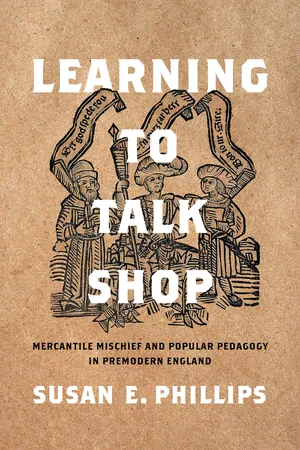
Learning to Talk Shop
Mercantile Mischief and Popular Pedagogy in Premodern England
- English
- ePUB (mobile friendly)
- Available on iOS & Android
Learning to Talk Shop
Mercantile Mischief and Popular Pedagogy in Premodern England
About this book
A new account of premodern education that offered non-elite readers lessons in navigating the premodern marketplace
Learning to Talk Shop explores the phrasebooks and guides to conversations that flooded the marketplace in the fifteenth and sixteenth centuries, making a virtual classroom available to an audience who could not afford or did not have access to formal education. Privileging market share and mercantile savvy over moral instruction and linguistic mastery, these mischievous little books offered readers lessons in the pragmatic, and murky, ethics of the premodern marketplace, teaching them bargaining tactics, insults, pick up lines, and strategies for welching on debts.
Revealing what happens when language learning itself undergoes a translation out of the classroom, into the marketplace and further down the social ladder, Susan E. Phillips offers a new account of premodern education, not through erudite tombs and schoolmaster sovereigns, but through these practical books that enabled non-elite readers to thrive in an environment not particularly conducive to their success. Phillips asks what we learn and whom we can see when we look at premodern education from this humbler, more mischievous perspective, telling the tales of resourceful chambermaids, savvy black stableboys, and arithmetically adept barmaids as well as the story of a schoolgirl who compiled a textbook of her own and the narrative of a black schoolmaster teaching in Shakespeare's London.
In these stories, Phillips finds the liberatory potential in a discourse that has previously been read as upholding traditional social hierarchies in the premodern period. If we expand our archive beyond the Latin textbooks of the grammar school classroom to include these bestselling bi- and multilingual vernacular textbooks, Phillips contends, we can see a radically different set of possibilities—a premodern pedagogy that is more expansive, more flexible, and more inclusive.
Frequently asked questions
- Essential is ideal for learners and professionals who enjoy exploring a wide range of subjects. Access the Essential Library with 800,000+ trusted titles and best-sellers across business, personal growth, and the humanities. Includes unlimited reading time and Standard Read Aloud voice.
- Complete: Perfect for advanced learners and researchers needing full, unrestricted access. Unlock 1.4M+ books across hundreds of subjects, including academic and specialized titles. The Complete Plan also includes advanced features like Premium Read Aloud and Research Assistant.
Please note we cannot support devices running on iOS 13 and Android 7 or earlier. Learn more about using the app.
Information
Table of contents
- Cover
- Series Page
- Title Page
- Copyright
- Dedication
- Contents
- Note on the Text
- Preface, or Why I Wrote This Book
- Introduction. A Tale of Pedagogical Mischief
- Chapter 1. Usurping the Schoolmaster: Profitable Books, Virtual Classrooms, and a New Vernacular Imitatio
- Chapter 2. Dallying with Debt
- Buyers Beware: A Moral Interlude
- Chapter 3. Getting to Yes: Popular Vernacular Marketplace Justice
- Chapter 4. Teaching “Otherwise”: Schoolmaster, Servants, Seduction, Slavery
- Coda. Teachers by Trade, or Seeing a Black Schoolmaster in Elizabethan London
- Appendix. Publishing Popular Vernacular Pedagogy: Circuits, Editions, Locations, Prices
- Notes
- Bibliography
- Index
- Acknowledgments